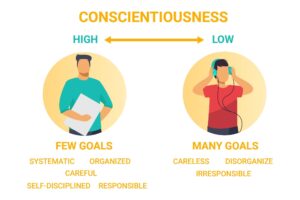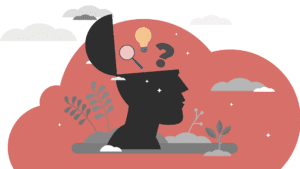The National Institute of Mental Health defines occasional Anxiety as usual and an expected part of life. But Anxiety Disorders involve more than temporary worry or fear.
Anxiety is a complex psychological construct involving multiple facets related to extensive worrying that may impair everyday function and quality of life.
Several anxiety disorders include Generalized Anxiety, panic, and phobia-related disorders.

General Anxiety Disorder
The General Anxiety Disorder-7 (GAD-7) is a self-reporting questionnaire for screening the severity of generalized anxiety disorder, testing for:
- Nervousness
- Inability to stop worrying
- Excessive worry
- Restlessness
- Difficulty in relaxing
- Easy irritation
- Fear of something awful happening
The GAD-7 assessment was designed for use by Health Professionals.
Since the General Anxiety Disorder-7 assessment relies on self-reporting, a qualified clinician should verify all responses and a definitive diagnosis should be made on clinical grounds, considering how well the patient understood the questionnaire and other relevant information from the patient.
A diagnosis of Generalized Anxiety Disorder should not be made based on GAD-7 scores alone or your own.
Taylor Manifest Anxiety Scale (TMAS)
However, suppose you’ve been feeling Anxiety for an extended period. In that case, your Anxiety may have become a disorder requiring proper treatment, and you need to make an appointment with your Doctor or a Mental Health Professional.
In 1953, Janet Taylor developed the Taylor Manifest Anxiety Scale (TMAS) assessment to measure Anxiety as a General Personality Trait to help identify subjects that would allow the study of Anxiety Disorders.
The assessment has been widely studied and used in research; however, some concerns exist that it does not measure a single trait but rather a basket of loosely related characteristics.
Zung Anxiety Scale (SAS)
The Zung Anxiety Scale (SAS) is a self-reporting assessment as a method of measuring levels of Anxiety in people who have anxiety-related symptoms.
The scale focuses on the most common General Anxiety Disorders; coping with stress typically causes Anxiety.
Social Anxiety
Social Anxiety is the fear of social situations that involve interaction with other people and is the fear and Anxiety of being negatively judged and evaluated by others. It is a pervasive disorder. It causes Anxiety and fear in almost all areas of a person’s life.
The defining feature of social anxiety disorder, also called social phobia, is intense Anxiety or fear of being judged, negatively evaluated, or rejected in a social or performance situation.
People with a social anxiety disorder may worry about acting or appearing visibly anxious (e.g., blushing, stumbling over words) or being viewed as stupid, awkward, or boring.
As a result, they often avoid social or performance situations, and when a problem cannot be avoided, they experience significant Anxiety and distress.
Many people with a social Anxiety disorder experience intense physical symptoms, such as a rapid heart rate, nausea, and sweating.
In addition, they may experience full-blown attacks when confronting a feared situation.
Although they recognize their fear is excessive and unreasonable, people with social anxiety disorder often feel powerless against their Anxiety.
Social anxiety disorder affects approximately 15 million American adults and is the second most commonly diagnosed anxiety disorder following specific phobia.
The average onset of social anxiety disorder is during the teenage years.
Although individuals diagnosed with social Anxiety commonly report extreme shyness in childhood, it is essential to note that this disorder is not simply shyness.
Social anxiety disorder can wreak havoc on the lives of those who suffer from it.
For example, individuals may decline a job opportunity that requires frequent interaction with new people or avoid going out to eat with friends because they fear their hands will shake when eating or drinking.
Symptoms may be so extreme that they disrupt daily life and can significantly interfere with daily routines, occupational performance, or social life, making it difficult to complete school, interview, get a job, and have friendships and romantic relationships.
People with social anxiety disorder are also at an increased risk for developing major depressive disorder and alcohol use disorders.
When Does It Happen?
Anyone with social anxiety disorder can experience it in different ways. But here are some everyday situations that people tend to have trouble with:
- Talking to strangers
- Speaking in public
- Dating
- Making eye contact
- Entering rooms
- Using public restrooms
- Going to parties
- Eating in front of other people
- Going to school or work
- Starting conversations
What Does It Feel Like?
Again, the experience may be different for everyone. Still, suppose you have Social Anxiety and are in a stressful situation. In that case, you might have physical symptoms like
- Rapid heartbeat
- Muscle tension
- Dizziness and light-headedness
- Stomach trouble and diarrhea
- Inability to catch your breath
- “Out-of-body” sensation
You may start having symptoms and getting anxious immediately before an event, or you might spend weeks worrying about it.
Afterward, you could spend much time and mental energy worrying about how you acted.
What Causes It?
No one thing causes social anxiety disorder.
Genetics likely has something to do with it: If you have a family member with social phobia, you’re more at risk of having it, too. It could also be linked to having an overactive amygdala — the part of the brain that controls your fear response.
Social anxiety disorder usually comes on at around 13 years of age. It can be linked to a history of abuse, bullying, or teasing.
Shy kids are also more likely to become socially anxious adults than children with overbearing or controlling parents.
Developing a health condition that draws attention to your appearance or voice could trigger social Anxiety.
How It Affects Your Life
Social anxiety disorder prevents you from living your life.
You’ll avoid situations that most people consider “normal.”
You might even have difficulty understanding how others can handle them so quickly.
When you avoid all or most social situations, it affects your relationships.
It can also lead to the following:
- Low self-esteem
- Negative thoughts
- Depression
- Sensitivity to criticism
- Poor social skills that don’t improve



